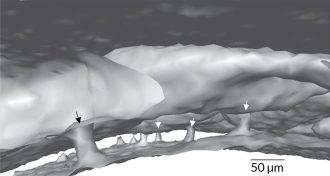Uncategorized
-
 Psychology
PsychologyHuge ‘word gap’ holding back low-income children may not exist after all
The claim that poor children hear fewer words than kids from higher-income families faces a challenge.
By Bruce Bower -
 Astronomy
AstronomyNew images reveal how an ancient monster galaxy fueled furious star formation
Scientists were able to see the abundance of star-forming gas and dust in a giant galaxy from when the universe was less than 2 billion years old.
-
 Materials Science
Materials ScienceA new material harnesses light to deice surfaces
A new sun-powered material could someday melt the ice off airplane wings, wind turbines and rooftops.
-
 Planetary Science
Planetary ScienceThe massive Mars dust storm is waning. Now, will Opportunity wake?
With a global dust storm on Mars finally passing, NASA hopes that its Opportunity rover will soon phone home.
-
 Climate
ClimateAs temperatures rise, so do insects’ appetites for corn, rice and wheat
Hotter, hungrier pests likely to do 10 percent to 25 percent more damage to grains for each warmer degree.
By Susan Milius -
 Neuroscience
NeuroscienceNewfound skull tunnels may speed immune cells’ trek to brain injuries
Minuscule channels connect the skull to the brain’s outer membrane, studies in mice and people show.
-
 Life
LifeHow the poppy got its pain-relieving powers
Analyzing the poppy’s genome reveals the evolutionary history of morphine.
-
 Health & Medicine
Health & MedicineCRISPR gene editing relieves muscular dystrophy symptoms in dogs
Scientists have used CRISPR’s molecular scissors in beagle puppies to repair a genetic mutation that causes muscular dystrophy.
-
 Physics
PhysicsThe strength of gravity has been measured to new precision
Researchers have measured Newton’s gravitational constant, known as Big G, with the greatest precision yet.
-
 Particle Physics
Particle PhysicsElectrons surf protons’ waves in a new kind of particle accelerator
For the first time, scientists accelerated electrons using plasma waves from proton beams.
-
 Earth
EarthArtificial intelligence could improve predictions for where quake aftershocks will hit
Scientists trained an artificial intelligence system to figure out where aftershocks are likely to occur.
-
 Health & Medicine
Health & MedicineOfficials raise Puerto Rico’s death toll from Hurricane Maria to nearly 3,000 people
Nearly 3,000 Puerto Ricans died due to Hurricane Maria as of February 2018, according to a new report.